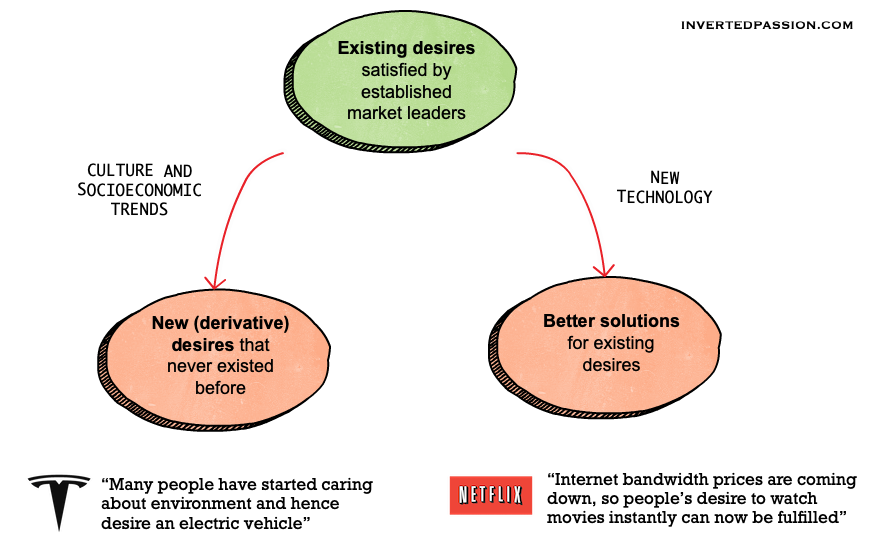1/ There are two ways an entrepreneur can fail:
a) launch a product that nobody desires;
b) launch a product that people desire but with no significant advantage over established competitors (hence give no strong reason for a customer to switch away).
2/ These two failure modes have their analogous success modes:
a) culture-led startup success where a new desire is discovered and fulfilled;
b) technology-led startup success where new technology is used to fulfill an existing desire.
3/ Let’s explore culture-led startups first.
They are the ones in which the entrepreneur is able to observe a pattern of new derivative desires that didn’t exist before.
Such trends are very hard to spot because initially they can be mistaken either as fads or insignificant.
4/ However, an entrepreneur who has good observation skills is able to connect the dots from diverse sources to grow his conviction about a cultural shift just when the market is ripe.
https://t.co/CdVsr53s4g
5/ This is why keeping an eye on early signs of growth in VC funding activity, new product launches, new regulations, and new careers/jobs is a great way to get a sense of which cultural trends are imminent.
6/ New cultural trends create new markets by creating new derivative desires that didn’t exist before.
The simplest example of this is banking or finance startups in developing nations.
Let's see how.
7/ Founders of these startups understand that as an economy grows, the population tends to consume more and therefore the desire for consumer finance products will naturally emerge.
8/ Notice that this is a bet on the future desires of consumers, but it is an informed bet because that’s how the story has played in other nations.
https://t.co/jYAqgzb8iW
9/ Another example of culture-led startups is the ever-growing number of startups around the idea of sharing and renting economy because the success of Uber and Airbnb has softened consumers into trusting strangers.
10/ This cultural change led to hundreds of other successful startups that are enabling, among many other services, sharing dog walking (Rover, DogBnB) and car parking (JustPark, ParkAmigo).
11/ Such companies are not using new technology.
Rather, they’re using existing technology and shifts in culture to offer a cheaper and more convenient solution to age-old desires of dog walking and parking.
https://t.co/VmfWoNBBm5
12/ Established competitors are usually focused on their existing market, which often is built to serve well-established desires.
Hence, a culture-led startup often has a wide “blue-ocean” of newly emerging derivative desires to fulfill.
13/ Now let's talk about technology-led startups
These startups require innovative technology for substantially improving upon solutions offered by existing players.
Such superior technology can either be developed in-house or be borrowed from an adjacent industry.
14/ The reason technology-led startups succeed is because new technology can help make a new product that’s cheaper, better, or faster than existing products.
And customers love making progress on those dimensions.
https://t.co/9wXsV2SQGE
15/ Christopher Clayton called this process “disruption” and suggested that the reason entrenched competitors ignore startups with innovative technology because initially, technology-led startups do not have a fully built solution for the entire market.
https://t.co/C1fEgXJSul
16/ New technology often looks like a gimmick in the early days and by the time established players realize the full potential, it’s already too late and a startup has gotten the escape velocity it needs.
17/ A classic example of a technology-led startup is Google.
Their key innovation was PageRank, using which they offered demonstrably better search results and beat other established players at that time (Yahoo and AltaVista).
18/ The culture-tech spectrum of startups is a continuum.
In reality, no successful startup is either only culture-led or only technology-led.
Usually, there’s a mix of both elements in successful startups.
19/ For example, Uber realized that people increasingly have internet and GPS-enabled phones and that people have developed a comfort with transacting online (a cultural trend).
20/ They combined this insight with technology innovations to produce a significantly better way to fulfill two pre-existing desires: faster taxi access to consumers and faster customer access to taxi-drivers.
21/ 🧠
Remember: best startup ideas capitalize on both emerging cultural trends and emerging technology.
22/ That's it!
Read the full chapter here:
https://t.co/iLfMb0xhnD
23/ I'm posting ~1 new mental model for entrepreneurs every week.
Here's the entire list of 60+ mental models that I'll cover in a year or so:
https://t.co/EJGAAJmPIU Make sure you sign up for email updates on the book page.
24/ Revisit the previous mental model here:
https://t.co/MVdtmznppO
25/ If you've reached this far in the thread, a question for you.
👇 👇
What are some examples of culture-led and tech-led startups that come to your mind?
